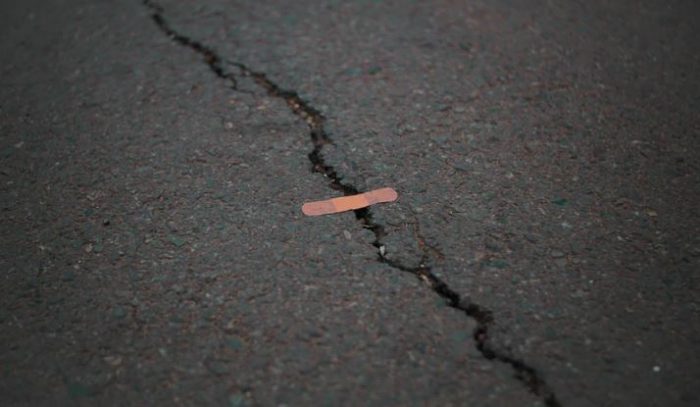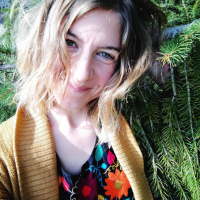Relephant read: Waylon’s continually updated article on the Coronavirus.
I remember when my dad died, the cacophony of grief colliding from each of us remaining in my small family.
The way the grief pooled, noisily and quietly, made it difficult to discern which feelings belonged to whom. I was, ironically, finishing a year-long internship as a bereavement counselor when grief came knocking at my own door. It was now my turn to fall headfirst into the dark unknown, putting what I’d been counseling others into personal practice.
Grief is a deeply private affair, even when it affects the collective. I didn’t know then how to grieve as an individual, let alone as a family unit. Western culture had not taught us this skill. Learning it gradually, over the course of a decade has been an awkward dance of autonomy and dependency.
I’m still learning.
It may be safe to say that, for the majority of us alive today, we’ve never experienced an event with the global impact to send us all into collective grief. Not until this pandemic. The impacts vary from place to place, but there is not a corner of the Earth where humans live that has not felt the ripple effects of this crisis. For the first time in my life, in most of our lives, we’re in the same boat weathering an unprecedented disaster.
The storm, however, may look vastly different for each of us in the boat.
For those who are not still in denial (the “fake pandemic” lot), the range of impact varies from one to ten on the Richter scale. One being “this is unnerving and inconvenient, but we’ll manage just fine,” and ten being “the world is crashing down around me and I might be crushed.”
Within this vast range, the experiences of grief are also vast. One person may be grieving the plunging stock market, loss of freedom to move about, or not being able to take a vacation. Another may be grieving a total loss of income, not being able to be present with a dying loved one, or walking daily into a war zone without protection, and watching people fall around them—knowing it could be them any moment.
Whatever the case, grief is grief and each loss matters. However, there is a need to be sensitive to these acutely different experiences. They are not all the same. We must resist trying to make them so.
We have an opportunity and a need to learn how to grieve as a collective for the first time in our lifetimes. It will be an awkward dance of letting each person own their individual stories of grief while coming together where our stories overlap.
One of the things that complicates this collective grief is that each of us have different comfort levels with expressing emotion and experiencing the emotions of others. A lot of people are not comfortable with sadness, in themselves or others. So, the sadness is often stuffed far down, dismissed, or prescribed with positivity.
I can’t count the number of times I’ve shared my grief publicly—be it personal, ecological, or pandemic—and been told to keep my chin up, to not cry, to stay positive, that everything is going to be okay. While I understand where these words come from, they’re almost never helpful, because they bypass the source of the grief.
I see this happening on a large scale across social media right now and it’s hard to watch. People are grasping for hope, which is an understandable human reaction, and in doing so, trying desperately to skip ahead to the end of the story where everything magically works out for the best.
“What if this pandemic is the Earth’s way of healing?”
“What if this is our big reset as a species?”
“This is an opportunity to become the person you’ve always wanted to be.”
“After we’ve all spent several months inside, we’ll never be the same again. We’ll be better.”
I’ve seen a lot of people organizing mass meditations for healing the world. I’ve been encouraged to commit to visualizing the world healed, as it could be instead of as it is. I’m not downplaying any of this. It all has the power to benefit and we each have our own part to play in sharing our gifts with the world.
I’m just tired of it as a prescription for grief.
I’ll confess, I’m skeptical about the power of visualization when it comes to changing the world. I’m an activist, which is rooted in, well, action. It’s true that my dedication to activism springs from a hope and vision for the world that is other than our current reality, but that vision alone is powerless without physically showing up to labor for its birth. We need both visualization and action, but visualization cannot replace action—and it cannot substitute for the deep work of grief.
We cannot manifest our way into a new kind of humanity any more than I believe we can sit at home and manifest ourselves into new jobs, new relationships, or newer, improved bodies.
We have to put in the work.
This time of self-isolating may be, for those of us who have the privilege, a time for deep introspection and self-reflection. For sitting in the discomfort and letting it be our teacher. And maybe, if enough of us are in a position to do this, we will emerge as a collective with a new vision we’re committed to acting upon as human beings.
But we’re not just going to come out of quarantine one day in the future and see a newly transformed world. Capitalism and its vast social inequities will not magically disappear during quarantine. The United States healthcare system will still be broken. Political leaders will still be up for election or re-election and we’ll still need to make courageous decisions about who and what will get our votes. Racism will still be deeply embedded in many of our societies. Wars will still be fought over power and wealth and religion and basic human rights and natural resources. The Amazon will still be burning, Australia still reeling from the bushfire devastation, and pipelines still pumping death through the Earth’s veins.
And we will have to choose what kind of humans we want to be on the other end of this.
Speaking of the “end of this,” I’ve heard myself utter the phrase many times, “when this is over…” It’s only now starting to sink in that this is a fallacy. This pandemic will never truly be over, in a similar way that losing my dad is never over. He will always be gone and I will always feel the hollowness of this echoing in my being. Accepting this is part of our work.
There is no switch, there are no words that will flip this crisis from On to Off.
Even when nations declare the emergency is over and life can begin to return to a sense of normalcy, we will emerge tentatively, shakily, and forever altered. We will begin the work of adjusting to a new normal. In the same way as grief rearranges and shapes our lives into Before Loss and After Loss, so will this pandemic. There will be the world we knew before COVID-19 and the world after. There will be repercussions of this crisis none of us can fully know, for generations to come—economically, physically, environmentally, socially, and mentally.
None of this is easy to swallow. But grief has never been an easy pill to swallow. Rather than fear it, ignore it, bypass it, or attempt to dress it up in pretty clothes, what grief asks of us in the time of this pandemic is to be willing to sit with it. To allow others to sit with it. To find our way to sitting with it together. To do what we need to do to cope, but to do so without needing to prescribe our way of coping to others.
I hold hope that, in the After of this crisis, we will commit ourselves to doing the collective work of birthing the world we want to see. My current grief does not negate this hope; it strengthens it.
May we find our steps together in this awkward, heart wrenching, beautiful dance of collective grief.
~
“We will not go back to normal. Normal never was. Our pre-corona existence was not normal other than we normalized greed, inequity, exhaustion, depletion, extraction, disconnection, confusion, rage, hoarding, hate and lack. We should not long to return, my friends. We are being given the opportunity to stitch a new garment. One that fits all of humanity and nature.” ~ Sonya Renee Taylor
“And the people stayed home. And read books, and listened, and rested, and exercised, and made art, and played games, and learned new ways of being, and were still. And listened more deeply. Some meditated, some prayed, some danced. Some met their shadows. And the people began to think differently. And the people healed. And, in the absence of people living in ignorant, dangerous, mindless, and heartless ways, the earth began to heal. And when the danger passed, and the people joined together again, they grieved their losses, and made new choices, and dreamed new images, and created new ways to live and heal the earth fully, as they had been healed.” ~ Kitty O’Meara, And The People Stayed Home
Relephant:
How to Enjoy Life Amidst the Coronavirus Fear: Your Go-To Guide from Books to Podcasts & Wellness Practices.
What the Coronavirus is Teaching Me: 5 Lessons from Uncertain Times.
The Artist’s Stay-at-Home & Stay Sane Guide.
10 Simple Ways to Boost your Immunity without Leaving the House.







Read 8 comments and reply